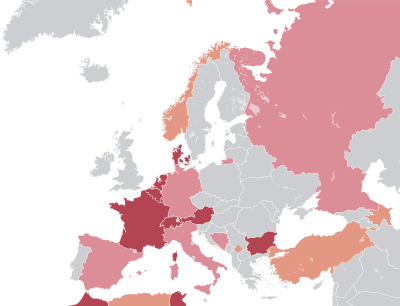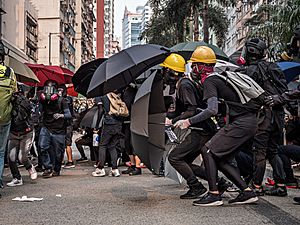Anti-mask law facts for kids
Anti-mask laws are rules that stop people from covering their faces in public. These laws are different in various places. They have different reasons, cover different situations, and have different punishments.
Contents
North America
United States
Many U.S. states and Washington, D.C. have anti-mask laws.
- New York State's law started in 1845. It was made to keep people safe after fights between landlords and tenants.
- A lot of these laws began in the mid-1900s. They were created to stop the violent actions of the Ku Klux Klan. Members of this group often wore white hoods to hide who they were.
- In the 2000s, these laws have been used against political protesters. This includes groups like the Occupy Movement or Anonymous. These groups sometimes wear Guy Fawkes masks.
People have argued that these laws go against the First Amendment to the United States Constitution. This amendment protects free speech and the right to gather in groups. Some courts have said that public safety is more important than free speech. They have supported these laws. For example, the Georgia Supreme Court said a law was fair. They felt that wearing a mask could be seen as a threat, which is not protected speech. This law allows exceptions for holidays, plays, and safety at work.
Other courts have stopped anti-mask laws. Laws in Tennessee and Florida were found to be too broad. A rule in Goshen, Indiana, was also stopped. This was because the First Amendment protects anonymous speech and groups.
Canada
- After some big protests, the Canadian Parliament passed Bill C-309. This law stops people from wearing masks during a riot or illegal gathering. It became law on June 19, 2013.
- Canada's Criminal Code also has a rule called "Disguise with Intent." This means if someone covers their face to commit a serious crime, they can go to prison for up to ten years.
- In 2017, a law in Quebec became known. It banned face coverings for people using government services.
Europe
Many European countries have rules about covering faces. The 2010 French ban on face covering is one of the strictest. It stops face coverings in almost all public places. Other countries, like Denmark, only limit face coverings during public gatherings or protests.
| State | Since | Limitations (examples) | Situations | Exceptions | Notes |
|---|---|---|---|---|---|
| Austria | 2002, 2017 | Burqas, niqabs, motorcycle full face helmets or face-covering scarves | Demonstrations, universities, public transportation or courthouses | Face covering for doing one's job | |
| Belgium | 2011 | Burqas, niqabs and other masks | In public (unspecified) | Upheld by the ECHR in 2017 | |
| Bulgaria | 2016 | Burqas, niqabs or other face-covering veils | Government offices, schools, cultural institutions and places of public recreation | Exceptions are allowed for health or professional reasons | National ban was preceded by local bans in Bulgarian towns |
| Denmark | 2000 | Hoods, masks, painting or the like or objects to cover one's face | Public assemblies | Masking to protect one's face against the weather | Does not apply in Greenland or the Faroe Islands |
| France | 2010 | Burqas, niqābs, motorcycle full face helmets, balaclavas, hoods and other face-covering veils | Public places | Full face helmets worn on motorcycles | Upheld by the ECHR in 2014 |
| Germany | 1985 | Items suitable and intended to prevent identification | Open-air public assemblies or other open-air public events or on the way there | Competent authorities may provide exemptions if there is no threat to public safety or public order | |
| Italy | 1975 | Any mask or clothing that obstructs identification | In public (unspecified) | Exceptions are allowed for a "justified cause" | There are disagreements whether one's religion is a "justified cause" |
| Netherlands | 2019 | Burqas, niqabs, motorcycle full face helmets, balaclavas | Public transport, in buildings and associated yards of educational, governmental and healthcare institutions | Face covering for doing one's job or sport, for health or security, in healthcare residences | In force since 1 August 2019 |
| Latvia | 2016 | Hoods, masks, burqas, niqabs or objects to cover one's face | Public places | Islamic face veil to be banned in Latvia | |
| Norway | 1995 | Masks (unspecified) | Public events such as demonstrations, marches, meetings, stands or similar | ||
| Spain | 2013 | Face-coverings (unspecified) | Public demonstrations | ||
| Sweden | 2005 | Face-coverings (unspecified) that complicate identification | Public demonstrations where public order is or may be disturbed | Does not apply to religion-motivated face-coverings, or when demonstrators are authorised to cover their faces |
Austria
Since 2002, Austria has banned masks at demonstrations. If a mask does not threaten public safety, it might not be punished. Breaking this rule can lead to fines or jail time.
In 2017, a new law was approved. It says people who wear face coverings like burqas, niqabs, or full-face helmets in places like universities or public transport will be fined. This law started in October 2017.
Belgium
A Belgian law from 2011 stops people from appearing in public with their face hidden. Breaking this law can lead to fines and up to seven days in jail. In 2017, the European Court of Human Rights supported this ban.
Denmark
Wearing masks during public gatherings is against the law in Denmark. This rule started in 2000. If you break it, you could get a fine or up to six months in prison. It is also illegal to have items meant for masking at a gathering. However, covering your face to protect it from the weather is allowed. This ban does not apply in Greenland or the Faroe Islands.
France
The French ban on face covering is a law passed in 2010. It bans wearing face-covering items like masks, helmets, or veils in public places. There are a few special situations where it is allowed.
Germany
Since 1985, it is against the law to hide your identity at public meetings, like protests. This is to make it harder for police to identify people. Breaking this rule can lead to up to one year in prison.
Italy
In Italy, a 1975 law strictly forbids wearing anything that hides a person's face. If you break this law, you can face fines and jail time. The law was first made to prevent crime or terrorism. It allows exceptions for a "justified cause." Some courts have said religious reasons count, but others disagree.
Latvia
In 2016, Latvia passed a law to ban the niqab and burqa across the whole country.
Netherlands
The Netherlands passed a limited anti-mask law in 2018. It is illegal to wear clothing that covers the whole face in public transport, schools, government buildings, and healthcare places. Examples include full-face helmets, balaclavas, burqas, or niqabs. Some exceptions are allowed. These include clothes for health, safety, or for certain jobs or sports.
Norway
In Norway, it is usually legal to cover your face in public. But it is not allowed when you are part of a public event. People in plays or masquerades are exceptions. Breaking this rule can lead to a fine or up to three months in prison.
Russia
A Russian law from 2012 says it is against the rules to wear masks or anything else that hides your identity during public events. The people organizing an event must make sure participants do not hide their identity. If you break this law, you can be punished with fines.
Spain
A law from 2013 in Spain says that protesters who cover their faces during demonstrations can be fined up to €30,000.
Sweden
A 2005 law in Sweden bans people from fully or partly covering their face at demonstrations. This is only if public order is being disturbed or might be disturbed. However, this ban does not apply if someone covers their face for religious reasons. It also does not apply if protesters are allowed to cover their faces.
Switzerland
Several areas in Switzerland, called cantons, have laws against wearing masks. These include Basel-Stadt, Zurich, Bern, Lucerne, Thurgau, Solothurn, and St. Gallen.
Ukraine
In 2014, Ukraine passed a law banning masks, helmets, or camouflage at public gatherings. This law was repealed later in January 2014.
United Kingdom
For about 100 years, covering or blacking one's face was a crime that could lead to the death penalty. This was under the Black Act of 1723, which was later cancelled in 1823.
Asia-Pacific
Australia
It is legal to wear a mask in public in Australia. However, motorcycle riders often need to remove their helmets when entering a bank. In New South Wales, a judge ruled that a woman could not give evidence in court while wearing a niqāb. Another judge in Victoria extended this rule to the public gallery.
In 2016, police in Victoria asked the government to make it illegal to wear a mask in public without a good reason. This was because of some violent street protests. During the COVID-19 pandemic, it was not illegal to wear a mask to protect from the virus. Police in New South Wales can ask drivers to remove head coverings, including masks, for identification.
Hong Kong
On October 4, 2019, the Government of Hong Kong used an old law to create the Prohibition on Face Covering Regulation (PFCR). This was an anti-mask law made because of the protests happening that year. The law stops protesters from covering their faces, fully or partly, during protests. This includes legal rallies or illegal gatherings.
Anyone who wears a mask at a protest could face up to a year in jail and a large fine. Exceptions are made for people wearing masks for work, religious reasons, or medical reasons. The law also says that if police tell someone to remove a mask and they refuse, they could face jail time and a fine. Even paint on the face is included. This law started on October 5, 2019.
Judicial review
On November 18, 2019, the High Court said parts of the anti-mask law were not fair. They said these parts limited basic rights too much. The court questioned why the law was made without a declared emergency. It also noted the law applied to both legal and illegal gatherings.
The court also said that the old law used to make the anti-mask rule might not fit with Hong Kong's basic law. The government said it would stop enforcing the ban for a while. However, a Chinese official said that only the National People’s Congress could decide if Hong Kong laws follow its basic law.
On November 22, 2019, the High Court paused its ruling for 7 days. This was to give the government time to appeal. The appeal hearing was set for January 9, 2020. The Court of Appeal later refused to suspend the ruling that the anti-mask law was unconstitutional.
See also
 In Spanish: Leyes antimáscaras para niños
In Spanish: Leyes antimáscaras para niños
 | Mary Eliza Mahoney |
 | Susie King Taylor |
 | Ida Gray |
 | Eliza Ann Grier |



